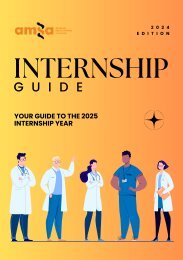Internship Guide 2020
The official guide to the 2021 Internship year. The 2020 Internship Guide was compiled entirely by medical students and junior doctors who have volunteered their time to ensure it is the most up to date source of information relevant to our final year medical students. We hope that the information within this guide will assist you in your internship application. Good luck, Class of 2020!
The official guide to the 2021 Internship year. The 2020 Internship Guide was compiled entirely by medical students and junior doctors who have volunteered their time to ensure it is the most up to date source of information relevant to our final year medical students. We hope that the information within this guide will assist you in your internship application. Good luck, Class of 2020!
Create successful ePaper yourself
Turn your PDF publications into a flip-book with our unique Google optimized e-Paper software.
WA COUNTRY<br />
HEALTH SERVICE<br />
10*<br />
NETWORK TRAINING SITES<br />
Albany Hospital, Bunbury Hospital<br />
ROTATIONS AVAILABLE<br />
Final year Medical Students have the option of<br />
selecting Western Australia Country Health Service<br />
(WACHS) as their Primary Employing Health Service<br />
(PEHS) for their internship year. This will allow you<br />
to spend your entire internship in a rural location,<br />
currently being either Bunbury or Albany.<br />
Albany<br />
Hospital<br />
Bunbury<br />
Hospital<br />
PREDICTED 2021 INTERNSHIP<br />
POSITIONS<br />
*5 for each site; this number excludes<br />
metro-based rotations;<br />
Emergency Medicine, General Medicine,<br />
General Surgery, Psychiatry, General<br />
Practice<br />
Emergency Medicine, General Medicine,<br />
General Surgery, Orthopaedics<br />
ROTATIONS AVAILABLE FOR METRO-<br />
BASED INTERNS:<br />
Rural options for metropolitan-based interns also<br />
remain available with interns being able to rotate to a<br />
rural hospital from Fiona Stanley Hospital, Royal Perth<br />
Hospital, Sir Charles Gairdner Hospital or Joondalup<br />
Health Campus (Junior Doctor Training Program –<br />
Private Hospital Stream only).<br />
Fiona Stanley Hospital based interns can rotate to:<br />
• Broome: General Medicine, General Surgery<br />
• Albany: General Medicine, General Practice<br />
Royal Perth Hospital based interns can rotate to:<br />
• Kalgoorlie: Emergency Medicine, General Medicine<br />
and General Surgery<br />
• Bunbury: Emergency Medicine, General Medicine,<br />
General Surgery and Orthopaedics<br />
• Port Hedland: General Surgery<br />
Sir Charles Gardiner Hospital based interns can<br />
rotate to:<br />
• Geraldton: General Medicine, General Surgery and<br />
Orthopaedics<br />
• Port Hedland: General Medicine<br />
Joondalup Health Campus based interns can rotate<br />
to:<br />
• Albany: Orthopaedics<br />
• Broome: Emergency Medicine, General Medicine<br />
• Geraldton: General Medicine, General Surgery<br />
118<br />
BASIC INFORMATION<br />
Albany is a beautiful port city situated some 400km<br />
south of Perth, perched on the Southern Ocean and<br />
facing Antarctica. With a strong historical heritage,<br />
there is plenty to explore in your time away from work.<br />
Albany Health Campus is the regional referral centre<br />
for the Great Southern region, servicing the needs of a<br />
population of approximately 55,000 people.<br />
Bunbury is a picturesque harbour city on the south<br />
west coast of WA, two hours’ drive from Perth in the<br />
heart of the state’s premiere holiday region.<br />
Bunbury Hospital is the regional hospital for the South<br />
West region, comprising a 135-bed public facility<br />
located alongside a similar size private hospital. The<br />
campus delivers health care to more than 80,000<br />
of the region’s local residents, as well as seasonal<br />
visitors, and acts as the regional referral centre for the<br />
district.<br />
WHY CHOOSE RURAL?<br />
Completing a rural internship or a rural rotation<br />
is a unique, challenging and ultimately rewarding<br />
experience. There are many reasons including:<br />
• Multi-disciplinary environment: You become an<br />
integral part of a supportive multi-disciplinary<br />
team and relied upon. It is your chance to learn<br />
from experienced clinicians, and liaise directly<br />
with allied health, nursing and external groups<br />
regarding patient care (e.g. Royal Flying Doctors<br />
Service). A sense of collegiality is at the forefront<br />
of the WA rural experience.<br />
• One-on-one learning: The small clinical teams<br />
offer close supervision and support by senior<br />
clinicians giving you one-on-one learning<br />
opportunities, no longer found in most large<br />
tertiary hospitals.<br />
• Increased exposure to procedural skills: There<br />
is an increased scope for procedural practice as<br />
there are less people on training programs queuing<br />
in front of you. You get to experience things<br />
like lumbar punctures, chest drains, ultrasound<br />
guided cannula insertion and you actually get into<br />
the theatre…. regularly!<br />
• A generalist approach: Working in a rural<br />
environment offers the opportunity to gain<br />
exposure to a variety of disciplines regardless of<br />
your term, enhancing the development of your<br />
knowledge and skillset.<br />
• Longitudinal exposure to patient care: Great<br />
breadth of experience and a variety of cases<br />
through frontline involvement with your patients<br />
from admission to discharge and beyond. In the<br />
country you will also find that you continue to<br />
see the patient in follow-up clinics. Experiencing<br />
patient care from beginning to end gives a holistic<br />
view of medicine that is not often available in the<br />
increasingly specialised metro hospitals.

















